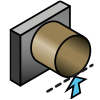Model attributes (Water Overlay): Difference between revisions
Jump to navigation
Jump to search
mNo edit summary |
No edit summary |
||
| Line 10: | Line 10: | ||
{{:Ground bottom distance m (Water Overlay)}} | {{:Ground bottom distance m (Water Overlay)}} | ||
{{:Ground water (Water Overlay)}} | {{:Ground water (Water Overlay)}} | ||
{{:Ground water depth m (Water Overlay)}} | |||
{{:Ground watertable with surface (Water Overlay)}} | {{:Ground watertable with surface (Water Overlay)}} | ||
{{:Impact flood threshold m (Water Overlay)}} | {{:Impact flood threshold m (Water Overlay)}} | ||
Revision as of 15:31, 9 February 2022
The Water Overlay's model calculations depend on a number of calculation-wide parameters. These parameters are available as attributes of the water overlay and can be modified as such.
Max water depth m (Water Overlay)
Minimal culvert diameter m (Water Overlay)
Seepage fluctuation (Water Overlay)
| Icon | Attribute | Unit | Range | Description | Default value |
|---|---|---|---|---|---|
| |
ALLOWED_WATER_INCREASE_M | m | The amount by which the water level on a water terrain must increase before it is considered stressed by water. This is used to compute the WATER_STRESS result type. | 0.4 | |
| |
AVG_SHORE_WIDTH_M | m | 0 to 10000 grid cells | With the surface water mode set to Grid Averaging, identified water average areas can be extended to include nearby shorelines within the configured distance. | 3 |
| |
BRIDGE_ELEVATION | nominal | 0 to 2 | Specifies the mode by which bridges are include in the elevation model, used for the water calculations. | Lowest |
| CULVERT_DEM_THRESHOLD_M | m | 0 to 10000 | The maximum distance a culvert's height can be below the terrain, for the terrain height to be adjusted to the threshold of the culvert. | 10 | |
| |
DESIGN_FLOOD_ELEVATION_M | m | Buildings in the model are assumed to have at most this height compared to the surface of the terrain. Greater values can create a more accurate model but will impact performance. | 1 | |
| |
GROUND_BOTTOM_DISTANCE_M | m | 0 to 10000 | Assumed distance under the surface terrain where the bottom boundary is situated. | 10 |
| GROUND_WATER | nominal value | Whether and how water in the ground is simulated during the calculation. | Infiltration Only | ||
| |
GROUND_WATER_DEPTH_M | m | -10000 to 10000 | The default depth of ground water in meters. | 1 |
| |
GROUND_WATERTABLE_WITH_SURFACE | boolean | Whether the ground watertable result type should also include the surface water level, when the groundwater levels are close to the surface. | True | |
| |
IMPACT_FLOOD_THRESHOLD_M | m | The amount of water a Building must experience before it is considered impacted by water. | 0,1 | |
| |
IMPACT_RANGE_M | m | the width in meters of the water next to or against the building that have to be flooded before the building is considered impacted by water. | 3 | |
 |
INCREASED_RESOLUTION | boolean | Load the DEM at twice the resolution. | False | |
| |
LIMIT_AREA | boolean | Whether calculations should occur in this area or not. | n/a | |
 |
LIMIT_RAIN | nominal value | Whether rainfall can be overridden by rainfall defined in rain areas across the project area. | 0 (Entire map) | |
 |
MAX_WATER_BOTTOM_M | m + datum | The maximum height for the bottoms of water terrains. Any water terrain with a bottom at a higher datum height has its bottom lowered to this value. | 10000 | |
| |
MIN_MAX_ELEVATION | boolean | Whether to use highest and lowest elevations found for a grid cell for land and water respectively when interpreting the elevation model. | 1.0 | |
 |
OBJECT_ENTRY_CORRECTION | cells | 0 to 3 cells | How many cells allowed to move a hydraulic structure's entry point when it overlaps with another hydraulic building. | 2 |
 |
SEWER_OVERFLOW_THRESHOLD | fraction (m/m) | 0 to 1 | How much of a sewer's storage must be filled with water before the sewer overflows are allowed to overflow water. | 0.9 |
| |
SHORELINE | boolean | Whether to automatically fill cells near a water terrain when there is a mismatch between the extend of the water terrain and the DEM. | True | |
| |
SHOW_DURATION_FLOOD_LEVEL_M | m | -10000 to 10000 | The amount of water which must be exceeded in a specific location before the duration of surface water can be recorded. This is used to compute the SURFACE_DURATION result type. | 0 |
| |
STABILIZER_ANGLE | angle (0-90°) | 0 to 90 | A partly flooded cell (especially at the edges of waterways) can become unstable when the angles in X and Y direction are too far apart. In this case the fluxes in U and V cannot easily be resolved mathematically while preserving balance. To prevent unrealistic fluxes from appearing, only the flux in the primary direction will be preserved. A stabilizer angle of zero means that all cells can be considered partly flooded cells, while an angle of 90 degrees will disable the stabilizer. | 10 |
| START_DATE_MS | long | The date and time which is considered the starting moment of the simulation. | 0 | ||
| |
SURFACE_WATER_EVAPORATION_FACTOR | factor | 0 to 10 | The factor by which the weather evaporation factor is multiplied to compute the amount of evaporation which takes place on the surface. | 1.3 |
| SURFACE_WATER | Nominal value | Whether and how water on the surface is simulated during the calculation. | Shallow | ||
 |
TIMEFRAMES | integer | 1 to 1000 | The number of intermediate results recorded during the calculation. Each timeframe becomes a snapshot of data which can be viewed and analysed. | 10 |
 |
WEIR_DAM_MULTIPLIER | factor | The width with which the weir's dam should be generated perpendicular to it's direction, relative to its flow width. | 3 |




